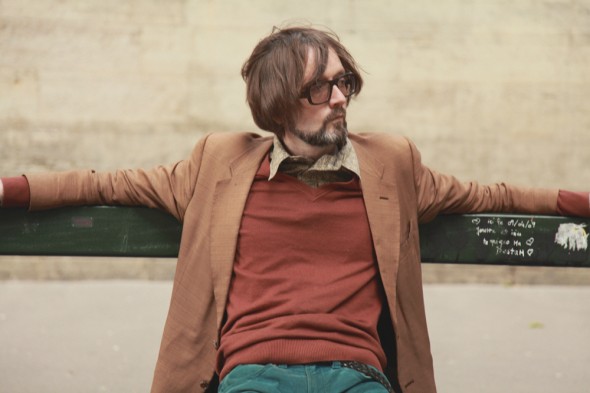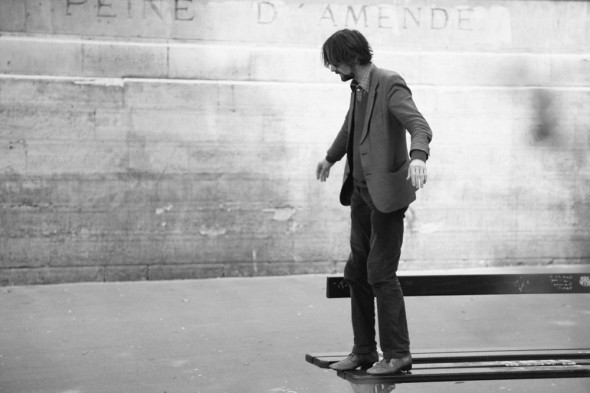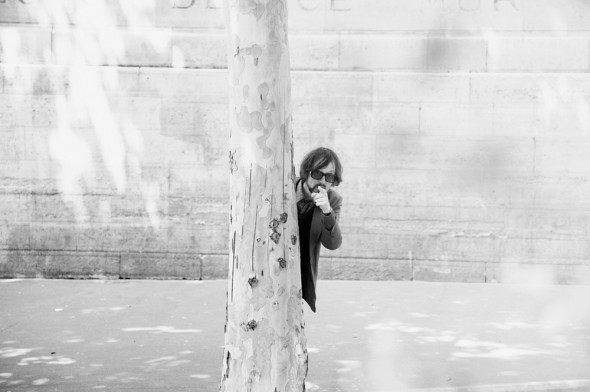
Jarvis Cocker’s Un-Ironic, Post Post-modern Rock Moment
A rock and roll band took over an art gallery in Paris this May, setting up camp for five days. They rehearsed, provided the background music for yoga classes, and played for a children’s event. In between downward-facing dog poses and puppet shows, they also performed for the gathering masses, who had no idea the lead singer was a Britpop icon. Musicians could sit in; non-musicians could just sit outside and watch the performance as it spilled out of the space and on to the cobbled Parisian streets. This being the, “look at me online” decade (not that self-promoting technology will vanish after ten years, but who can imagine what the next Twitter will be), a lot of the events were captured by cell phones and cameras, and were posted online immediately thereafter. It was a grand yet subtle extravaganza, and it fulfilled the creator’s vision of both self-exhibition, as well as exploring the question, “What is Music?” The man who asked the question was quite happy with the answer.
“The gallery thing was us rehearsing for the tour,” says Jarvis Cocker, via a cell phone rapidly running out of batteries. He’s walking along the famous Brighton Pier before tonight’s show, with the sound of seagulls heard across the Atlantic. “I wanted to deliver music in a different way, whether or not it was bogus or valid to have it in a gallery. I’m not sure, but because it worked so well I’ve been considering doing it in different places.”
Cocker’s career has taken many turns since he first set out to chronicle the absurdities and triumphs of the human condition in Sheffield over 30 years ago. A quick glance at his CV finds Cocker toiling in obscurity before rocketing to fame in Pulp as the cheeky, suburban, misshapen one in a Britpop trifecta (Liam Gallagher the yob and Damon Albarn the toff being the other two pillars of pretension), dropping out of the “Top of the Pops” rat race to write songs and make videos for other people, starting a goth/electro project, and eventually settling in Paris to have a family and make solo records, it comes as absolutely no surprise to see him experimenting in an art gallery; looking like Fred Astaire after a long week.

Besides giving Cocker’s band a bit of rehearsal time before hitting the road, the gallery events also resulted in a cobbled together video for “Angela,” the first single from his new album Further Complications.
“With the video I thought I’d invented a sort of post post-modern form. A lot of people posted clips on MySpace that they had taped, and I took some of those and created my own video,” says the singer, who after all, did study film at St. Martins College (see: second line in “Common People”). “Strangely enough, one guy got ticked off and wanted to get paid for me using his clip. With all the arguments and debates about copyright and people just posting what they want, I thought it was pretty rich that this guy took offense that I’d made his clip into a video. I like what technology enables us, but there are a lot of grey areas, obviously.”
While these undefined areas may be an inevitable byproduct of the continuous content explosion, there has never been any doubt as to who Cocker is as an artist. For all his creative diversions, he has always managed to be unmistakably “Jarvis.” Which is why we need not worry about what many critics are calling a “rock” record. “Has Jarvis gone rock?” whine the British press, understandably anxious for a story since Lily Allen seems to have cleaned up her act, and Susan Boyle’s 15 minutes have come and gone. The answer is: yes; and, who cares. It’s still “Jarvis.”
As expected, the singer has worked out the “rock” discussion for himself, and has analyzed the motivations for his current guitar-driven sound. “A few years ago I came to the realization that this band could play rock songs quite well. I’d rejected rock as what punk was kicking against; that ‘rock’ was the establishment that we were trying to get rid of. And now that we live in an anniversary culture, a rock heritage culture, I certainly wanted to reject any associations with that. In the last four or five years rock music has just become soundtracks to video games like Guitar Hero; it’s hard to find rock music that isn’t ironic really.” Cocker’s response to the current state of affairs in rock music is, however, to rise above. “During the course of touring, I was educated to the fact that parts of rock music were OK. So it became a challenge to try and do something valid; it certainly wasn’t an academic exercise,” he says.

Further Complications opens with “Angela.” With it, a fuzzed guitar line straight out of “Lust For Life” kicks things off as Jarvis sings the first of many of the tri-syllabled moniker. “I just took [the name] out of the air because I liked the three syllables and it’s not a very rock and roll name. Turns out it was the name of our keyboard player’s partner, so when he heard it he was wondering what I was up to with his girlfriend. I’ve met quite a few since then,” he explains. The rock elements of the album, which are quite loud and wouldn’t be out of place next to the White Stripes on a jukebox, is accentuated by the knowledge that the famed yank studio rat Steve Albini—best known for helming thundering sonic outbursts from Nirvana, Sonic Youth and The Pixies—engineered the album.
How did Albini and the prince of Britpop find each other? “Working with Steve was kind of an accident,” says the singer. “We were at the Pitchfork Festival in Chicago and were just introduced to him. It worked out great because, of all the producers I’ve worked with, he’s the one who was most concerned with not altering what the band is. However, if you sent this record to a publication like Metal Hammer (U.K. metal music magazine) and said that it was ‘rock’ they’d probably laugh at you. It’s not a rock record in those terms.” And it’s lazy to generalize Further Complications as just a rock record. “I Never Said I was Deep” would have been comfortably at home on Pulp’s ‘96 release of b-sides, Second Class. And the only guitar one hears on the nine minute closer “You’re In My Eyes (Discosong)” is a ‘70s era Mod Squad wakka wakka.
Another potentially positive outcome from the Albini association, at least as far as Midwestern audiences are concerned, is Cocker’s newfound interest in our flyover states, which are often ignored by British touring acts. Cocker plays east and west coasts in July before heading back to Europe. “You can’t really call it a tour; we’re only doing three shows. We do that thing that English bands always do, which is just playing the edges, but I’d certainly like to play in Chicago because we recorded the record there and we got to know it.” Even playing standard US cities has deep associations for the artist. “ I’ve had problems with New York because I had a nervous breakdown there and for a while I was scared of going there. Certain locations would make me feel really anxious, but for the last four or five years when I’ve gone back I’ve really enjoyed it,” he says. At this point in the conversation, Jarvis asks for a break, and excessive panting is heard. “Sorry, I’m trying to get over a wall at the moment. If you hear a scream, you’ll know that something’s gone wrong,” he says. All is quiet, and then: “Well that went really well, I’m trying to get to the beach, you see, it’s a beautiful day in Brighton.”

Cocker played the pop star well throughout the heady days of Britpop. NME covers too many to mention, paparazzi following his every midnight curry run, and the Michael Jackson Brit Awards notorious stage invasion (enough has been said on this, if still interested, Google it). But there was always the sense that there was more to him than who the media thought he was or was not shagging, or the drugs he was or was not doing.
Despite his new clothing line, Gallagher will never really emerge from the mantle of Oasis front man, and he most likely doesn’t want to. With Cocker, there was never any surprise when he took a break from the spotlight and went off to do his own thing; such as the Arctic expedition he took last year to learn about climate change from a group of working scientists.
“Someone asked me if I was turning into the indie Sting when I took that trip,” he laughs. “The reason for me going was that there were scientists on board and I wanted to be a bit more educated about climate issues. I’m always a bit weary about people using their position to preach, because that implies that they have a fresh perspective on something. And in the case of rock stars, that’s usually not true, because rock stars really only have knowledge of themselves, and that’s what they want to talk about.” Being the good multi-tasker, the trip also resulted in a new tune as well. “ ‘Slush’ was written onboard the boat and in an oblique way addresses the climate issue.”
As the Britpop elder statesman, Cocker seems at ease with his current level of fame. Success has afforded him the luxury of being able to indulge his artistic wants, while still producing modern rock epics and touring the world. And although his public persona is as British as Country Life butter, he seems quite happy to call Paris home. “It took a while to get used to French culture, the whole going out thing is different for a start. And I know it’s a bit of a cliché, but Paris in the springtime is lovely,” he sighs.
With his cell phone fading, we leave Jarvis to Brighton, and the inevitably warm reception awaiting him at tonight’s show. The phone may need charging, but we’ve no doubt that the man will be energized, and energizing us, for years to come.
Text by Adam Pollock
Photography by Virgili Jubero

